Preparation and understanding
Fluent bit is a plug-in, lightweight, multi platform and open source log collection tool written in C. It allows data to be collected from different sources and sent to multiple destinations. Fully compatible with docker and kubernetes ecological environment.
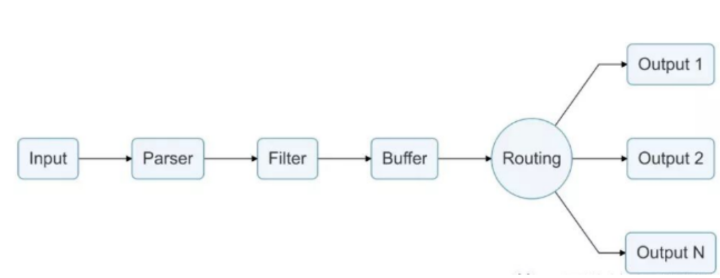
img
The above figure is a global overview of its workflow. It collects logs through input, transformation, filtering, buffering and routing to output.
By configuring the fluent bit input and output plug-ins, you can collect logs from different channels and output them to the target channel.
Fluent bit itself is written in C language, so it is difficult to extend plug-ins. The official provides the implementation. The official provides fluent bit go, which can write plug-ins in go language. At present, it only supports the writing of output.
To collect K8s container logs using fluent bit, you need to complete the following input configuration in the conf file of fluent bit (the location of container log file running in docker is configured here, and fluent will collect logs in the file and automatically complete simple filtering and cleaning operations):
[INPUT] Name tail #The tail plug-in is used here, which has a similar behavior to the tail -f shell command. The following configuration items will vary depending on the plug-in selected here Tag kube.* #The tag of the read row Path /var/log/containers/*.log #Specify the path to a specific log file or multiple log files by using generic wildcards. Parser docker #Specifies the name of the parser DB /var/log/flb_kube.db #Specify a database file to track monitored files and offsets Mem_Buf_Limit 5MB #Set the memory limit that the Tail plug-in can use. Skip_Long_Lines On #When the monitored file reaches the buffer capacity due to a long line, monitoring is stopped by default Refresh_Interval 10 //The interval, in seconds, between refreshing the list of monitored files
The output configuration is completed according to the output plug-in written by yourself (a ClickHouse plug-in is written):
[OUTPUT] Name clickhouse #Plug in name Match * #Matching range
At present, the official output plug-in of fluent bit does not support clickhouse, so it needs to be developed by itself.
Package the output plug-in as an OS package and combine fluent bit to form a docker image. Configure fluent bit to run as a container in k8s by mounting the configMap configuration file. Run a pod on each node node. Fluent bit collects logs through the log collection location configured in the configuration file, After processing, the configured output plug-in is used to store the data in ClickHouse.
According to the user's needs, the user can edit the output plug-in to connect the log to other databases or middleware for output (such as mysql, redis, etc.)
The following output plug-in code supporting clickhouse is attached:
Fluent bit will call the flbpluginregister (plug-in registration, identifying the plug-in name, which should correspond to OUTPUT.Name in fluent bit configuration), flbplugininit (plug-in initialization), flbpluginflush (plug-in output logic, which can simply process log data and complete output operation) and FLBPluginExit (plug-in exit) methods written by the user to complete the output of log data.
package main
import (
"C"
"database/sql"
"fmt"
"os"
"strconv"
"sync"
"time"
"unsafe"
"github.com/fluent/fluent-bit-go/output"
"github.com/kshvakov/clickhouse"
klog "k8s.io/klog"
)
var (
client *sql.DB
database string
table string
batchSize int
insertSQL = "INSERT INTO %s.%s(date, cluster, namespace, app, pod_name, container_name, host, log, ts) VALUES (?, ?, ?, ?, ?, ?, ?, ?, ?)"
rw sync.RWMutex
buffer = make([]Log, 0)
)
const (
DefaultWriteTimeout string = "20"
DefaultReadTimeout string = "10"
DefaultBatchSize int = 1024
)
type Log struct {
Cluster string
Namespace string
App string
Pod string
Container string
Host string
Log string
Ts time.Time
}
//export FLBPluginRegister
func FLBPluginRegister(ctx unsafe.Pointer) int {
return output.FLBPluginRegister(ctx, "clickhouse", "Clickhouse Output Plugin.!")
}
//export FLBPluginInit
// ctx (context) pointer to fluentbit context (state/ c code)
func FLBPluginInit(ctx unsafe.Pointer) int {
var host string
if v := os.Getenv("CLICKHOUSE_HOST"); v != "" {
host = v
} else {
klog.Error("you must set host of clickhouse!")
return output.FLB_ERROR
}
var user string
if v := os.Getenv("CLICKHOUSE_USER"); v != "" {
user = v
} else {
klog.Error("you must set user of clickhouse!")
return output.FLB_ERROR
}
var password string
if v := os.Getenv("CLICKHOUSE_PASSWORD"); v != "" {
password = v
} else {
klog.Error("you must set password of clickhouse!")
return output.FLB_ERROR
}
if v := os.Getenv("CLICKHOUSE_DATABASE"); v != "" {
database = v
} else {
klog.Error("you must set database of clickhouse!")
return output.FLB_ERROR
}
if v := os.Getenv("CLICKHOUSE_TABLE"); v != "" {
table = v
} else {
klog.Error("you must set table of clickhouse!")
return output.FLB_ERROR
}
if v := os.Getenv("CLICKHOUSE_BATCH_SIZE"); v != "" {
size, err := strconv.Atoi(v)
if err != nil {
klog.Infof("you set the default bacth_size: %d", DefaultBatchSize)
batchSize = DefaultBatchSize
}
batchSize = size
} else {
klog.Infof("you set the default bacth_size: %d", DefaultBatchSize)
batchSize = DefaultBatchSize
}
var writeTimeout string
if v := os.Getenv("CLICKHOUSE_WRITE_TIMEOUT"); v != "" {
writeTimeout = v
} else {
klog.Infof("you set the default write_timeout: %s", DefaultWriteTimeout)
writeTimeout = DefaultWriteTimeout
}
var readTimeout string
if v := os.Getenv("CLICKHOUSE_READ_TIMEOUT"); v != "" {
readTimeout = v
} else {
klog.Infof("you set the default read_timeout: %s", DefaultReadTimeout)
readTimeout = DefaultReadTimeout
}
dsn := "tcp://" + host + "?username=" + user + "&password=" + password + "&database=" + database + "&write_timeout=" + writeTimeout + "&read_timeout=" + readTimeout
db, err := sql.Open("clickhouse", dsn)
if err != nil {
klog.Error("connecting to clickhouse: %v", err)
return output.FLB_ERROR
}
if err := db.Ping(); err != nil {
if exception, ok := err.(*clickhouse.Exception); ok {
klog.Errorf("[%d] %s \n%s\n", exception.Code, exception.Message, exception.StackTrace)
} else {
klog.Errorf("Failed to ping clickhouse: %v", err)
}
return output.FLB_ERROR
}
// ==
client = db
return output.FLB_OK
}
//export FLBPluginFlush
// FLBPluginFlush is called from fluent-bit when data need to be sent. is called from fluent-bit when data need to be sent.
func FLBPluginFlush(data unsafe.Pointer, length C.int, tag *C.char) int {
rw.Lock()
defer rw.Unlock()
if err := client.Ping(); err != nil {
if exception, ok := err.(*clickhouse.Exception); ok {
klog.Errorf("[%d] %s \n%s\n", exception.Code, exception.Message, exception.StackTrace)
} else {
klog.Errorf("Failed to ping clickhouse: %v", err)
}
return output.FLB_ERROR
}
var ret int
var timestampData interface{}
var mapData map[interface{}]interface{}
dec := output.NewDecoder(data, int(length))
for {
ret, timestampData, mapData = output.GetRecord(dec)
if ret != 0 {
break
}
var timestamp time.Time
switch t := timestampData.(type) {
case output.FLBTime:
timestamp = timestampData.(output.FLBTime).Time
case uint64:
timestamp = time.Unix(int64(t), 0)
default:
timestamp = time.Now()
}
flattenData, err := Flatten(mapData, "", UnderscoreStyle)
if err != nil {
break
}
log := Log{}
for k, v := range flattenData {
value := ""
switch t := v.(type) {
case string:
value = t
case []byte:
value = string(t)
default:
value = fmt.Sprintf("%v", v)
}
switch k {
case "cluster":
log.Cluster = value
case "kubernetes_namespace_name":
log.Namespace = value
case "kubernetes_labels_app":
log.App = value
case "kubernetes_labels_k8s-app":
log.App = value
case "kubernetes_pod_name":
log.Pod = value
case "kubernetes_container_name":
log.Container = value
case "kubernetes_host":
log.Host = value
case "log":
log.Log = value
}
}
log.Ts = timestamp
buffer = append(buffer, log)
}
// sink data
if len(buffer) < batchSize {
return output.FLB_OK
}
sql := fmt.Sprintf(insertSQL, database, table)
tx, err := client.Begin()
if err != nil {
klog.Errorf("begin transaction failure: %s", err.Error())
return output.FLB_ERROR
}
// build statements
smt, err := tx.Prepare(sql)
if err != nil {
klog.Errorf("prepare statement failure: %s", err.Error())
return output.FLB_ERROR
}
for _, l := range buffer {
_, err = smt.Exec(l.Ts, l.Cluster, l.Namespace, l.App, l.Pod, l.Container, l.Host,
l.Log, l.Ts)
if err != nil {
klog.Errorf("statement exec failure: %s", err.Error())
return output.FLB_ERROR
}
}
// commit and record metrics
if err = tx.Commit(); err != nil {
klog.Errorf("commit failed failure: %s", err.Error())
return output.FLB_ERROR
}
buffer = make([]Log, 0)
return output.FLB_OK
}
//export FLBPluginExit
func FLBPluginExit() int {
return output.FLB_OK
}
func main() {
}
Data structure of ClickHouse
Create table sql
The table structure here can be modified as needed. The specific warehousing operations are developed in the output plug-in.
CREATE DATABASE IF NOT EXISTS scmp;
CREATE TABLE IF NOT EXISTS scmp.logs(
date Date DEFAULT toDate(0),
cluster String,namespace String,
app String,
pod_name String,
container_name String,
host String,log String,
ts DateTime)
ENGINE = MergeTree() PARTITION BY toYYYYMMDD(date)
ORDER BY (cluster, namespace, app, pod_name, container_name, host,ts);
Table structure
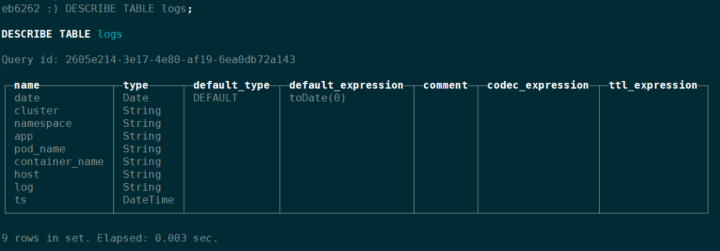
img
Deploy corresponding K8s resources
Mounted profile:
apiVersion: v1
kind: ConfigMap
metadata:
name: k8s-log-agent-config
namespace: kube
labels:
k8s-app: k8s-log-agent
data:
# Configuration files: server, input, filters and output
# ======================================================
fluent-bit.conf: |
[SERVICE]
Flush 1
Log_Level error
Daemon off
Parsers_File parsers.conf
HTTP_Server On
HTTP_Listen 0.0.0.0
HTTP_Port 2020
@INCLUDE input-kubernetes.conf
@INCLUDE filter-kubernetes.conf
@INCLUDE output-kubernetes.conf
input-kubernetes.conf: |
[INPUT]
Name tail
Tag kube.*
Path /var/log/containers/*.log
Parser docker
DB /var/log/flb_kube.db
Mem_Buf_Limit 5MB
Skip_Long_Lines On
Refresh_Interval 10
filter-kubernetes.conf: |
[FILTER]
Name kubernetes
Match *
Kube_URL https://kubernetes.default.svc.cluster.local:443
Merge_Log On
Annotations Off
Kube_Tag_Prefix kube.var.log.containers.
Merge_Log_Key log_processed
[FILTER]
Name modify
Match *
Set cluster ${CLUSTER_NAME}
output-kubernetes.conf: |
[OUTPUT]
Name clickhouse
Match *
parsers.conf: |
[PARSER]
Name apache
Format regex
Regex ^(?<host>[^ ]*) [^ ]* (?<user>[^ ]*) \[(?<time>[^\]]*)\] "(?<method>\S+)(?: +(?<path>[^\"]*?)(?: +\S*)?)?" (?<code>[^ ]*) (?<size>[^ ]*)(?: "(?<referer>[^\"]*)" "(?<agent>[^\"]*)")?$
Time_Key time
Time_Format %d/%b/%Y:%H:%M:%S %z
[PARSER]
Name apache2
Format regex
Regex ^(?<host>[^ ]*) [^ ]* (?<user>[^ ]*) \[(?<time>[^\]]*)\] "(?<method>\S+)(?: +(?<path>[^ ]*) +\S*)?" (?<code>[^ ]*) (?<size>[^ ]*)(?: "(?<referer>[^\"]*)" "(?<agent>[^\"]*)")?$
Time_Key time
Time_Format %d/%b/%Y:%H:%M:%S %z
[PARSER]
Name apache_error
Format regex
Regex ^\[[^ ]* (?<time>[^\]]*)\] \[(?<level>[^\]]*)\](?: \[pid (?<pid>[^\]]*)\])?( \[client (?<client>[^\]]*)\])? (?<message>.*)$
[PARSER]
Name nginx
Format regex
Regex ^(?<remote>[^ ]*) (?<host>[^ ]*) (?<user>[^ ]*) \[(?<time>[^\]]*)\] "(?<method>\S+)(?: +(?<path>[^\"]*?)(?: +\S*)?)?" (?<code>[^ ]*) (?<size>[^ ]*)(?: "(?<referer>[^\"]*)" "(?<agent>[^\"]*)")?$
Time_Key time
Time_Format %d/%b/%Y:%H:%M:%S %z
[PARSER]
Name json
Format json
Time_Key time
Time_Format %d/%b/%Y:%H:%M:%S %z
[PARSER]
Name docker
Format json
Time_Key time
Time_Format %Y-%m-%dT%H:%M:%S.%L
Time_Keep On
[PARSER]
Name syslog
Format regex
Regex ^\<(?<pri>[0-9]+)\>(?<time>[^ ]* {1,2}[^ ]* [^ ]*) (?<host>[^ ]*) (?<ident>[a-zA-Z0-9_\/\.\-]*)(?:\[(?<pid>[0-9]+)\])?(?:[^\:]*\:)? *(?<message>.*)$
Time_Key time
Time_Format %b %d %H:%M:%S
Resource permission control:
apiVersion: rbac.authorization.k8s.io/v1
kind: ClusterRoleBinding
metadata:
name: k8s-log-agent-read
roleRef:
apiGroup: rbac.authorization.k8s.io
kind: ClusterRole
name: k8s-log-agent-read
subjects:
- kind: ServiceAccount
name: k8s-log-agent
namespace: kube-system
---
apiVersion: rbac.authorization.k8s.io/v1
kind: ClusterRole
metadata:
name: k8s-log-agent-read
rules:
- apiGroups: [""]
resources:
- namespaces
- pods
verbs: ["get", "list", "watch"]
---
apiVersion: v1
kind: ServiceAccount
metadata:
name:k8s-log-agent
namespace: kube
Start the container on each node:
apiVersion: apps/v1
kind: DaemonSet
metadata:
name: k8s-log-agent
namespace: kube
labels:
k8s-app: k8s-log-agent
version: v1
kubernetes.io/cluster-service: "true"
spec:
selector:
matchLabels:
k8s-app: k8s-log-agent
template:
metadata:
labels:
k8s-app: k8s-log-agent
version: v1
kubernetes.io/cluster-service: "true"
annotations:
prometheus.io/scrape: "true"
prometheus.io/port: "2020"
prometheus.io/path: /api/v1/metrics/prometheus
spec:
containers:
- name: fluent-bit
image: iyacontrol/fluent-bit-ck:1.2.2
imagePullPolicy: Always
ports:
- containerPort: 2020
resources:
limits:
cpu: 200m
memory: 200Mi
requests:
cpu: 200m
memory: 200Mi
env:
- name: CLUSTER_NAME
value: "clickhouse"
- name: CLICKHOUSE_HOST
value: "10.1.62.62:9150"
- name: CLICKHOUSE_USER
value: "oms"
- name: CLICKHOUSE_PASSWORD
value: "EBupt123"
- name: CLICKHOUSE_DATABASE
value: "scmp"
- name: CLICKHOUSE_TABLE
value: "logs"
- name: NODENAME
valueFrom:
fieldRef:
fieldPath: spec.nodeName
volumeMounts:
- name: varlog
mountPath: /var/log
- name: varlibdockercontainers
mountPath: /var/lib/docker/containers
readOnly: true
- name: k8s-log-agent-config
mountPath: /fluent-bit/etc/
terminationGracePeriodSeconds: 10
volumes:
- name: varlog
hostPath:
path: /var/log
- name: varlibdockercontainers
hostPath:
path: /var/lib/docker/containers
- name: k8s-log-agent-config
configMap:
name: k8s-log-agent-config
serviceAccountName: k8s-log-agent
tolerations:
- key: node-role.kubernetes.io/master
operator: Exists
effect: NoSchedule
Database storage results
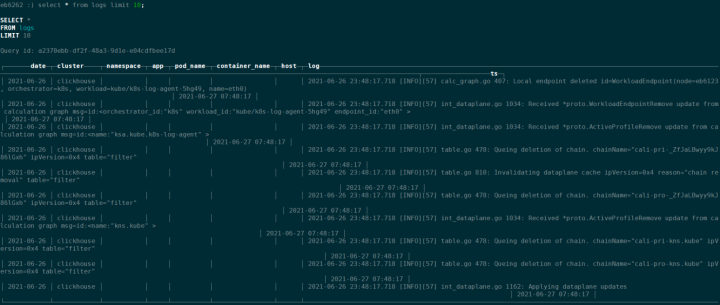
img
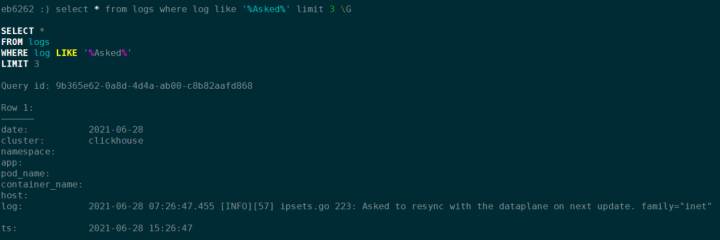
img
fluent simple performance test
Test preparation
FLB input plug-in configuration:
Name Tail #Using tail mode Buffer_Chunk_Size 32k #Set the initial buffer size to read file data. The default is 32 Buffer_Max_Siz 32k #Set the buffer size limit for each monitored file. The default is 32 Mem_Buf_Limit 5MB #Set the memory limit that the Tail plug-in can use when attaching data to the engine. If the limit is reached, suspend; When the data is refreshed, it is restored. No default Skip_Long_Lines On #When the length of a log line exceeds buffer_ Max_ When size is set to no, stop monitoring the file. Set to on to skip long lines and continue processing other lines suitable for the buffer size. The default off is to stop monitoring the file Refresh_Interval 10 #The time interval for getting the log again is 60 by default Read_from_Head False #For newly discovered files at the beginning (without database offset / location), read the contents from the head of the file instead of the tail. The default is False Rotate_Wait 5 #Specifies the extra time to monitor the file once when some pending data is refreshed. The default is 5 DB /var/log/flb_kube.db #Specify a database file to record monitored files and offsets DB.sync normal #Set the default synchronization (I/O) method to normal DB.locking false #The specified database can only be accessed by Fluent Bit. The default is false DB.journal_mode WAL #Set the log mode of the database to default wal exit_on_eof false #When reading a file, it exits the default false immediately when it reaches the end of the file
FLB filter configuration:
Name kubernetes #Using tail mode Match * #Matching rules Kube_URL https://kubernetes.default.svc.cluster.local:443 #k8s API server endpoint Merge_Log On #When enabled, it checks whether the content of the log field is a JSON string mapping, and if so, attaches the mapping field as part of the log structure. Annotations On #Include the Kubernetes resource annotation in the additional metadata. The default is on Kube_Tag_Prefix kube.var.log.containers. #When the source record is from the Tail input plug-in, this option specifies the prefix used in the Tail configuration Merge_Log_Key log_processed #Enable merge_ After log, the filter will try to assume that the log field in the incoming message is a JSON string message, and structurally represent it at the same level of the log field in the mapping. After setting the key, all new structured fields extracted from the original log content will be inserted under the new key
No upper limit is set for cpu and mem of FLB operating environment
Test start
Record the change range of cpu and memory within 10 minutes under FLB no-load, log printing frequency of 5000 pieces / s, 1000 pieces / s, 500 pieces / s, 200 pieces / s, 50 pieces / s and 1 piece / s, the time from the beginning of log recording to the beginning of retention under various conditions, and the number of log retention in a period of time after retention.
The test is performed directly using the htop command
The number of detained entries after 3 minutes is not recorded within the number of logs generated in 10 seconds
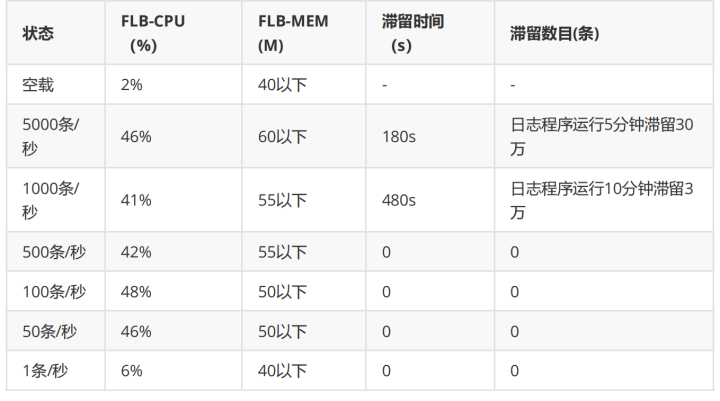
img
An interesting point found in the test is that when the log printing frequency is in the range of 1000 / s and 500 / s, the fluctuation of cpu is relatively stable, not more than 10%. However, in other conditions, in the states of 5000 / s and 100 / s and 50 / s, the fluctuation range of cpu is very large, the highest value can reach 52 and the lowest value can reach 35, This special value occurs more times than 1000 and 500 per second.
In combination with the previous tests, the stability interval of cpu at 1000 bars / S is lower than that at 500 bars / s.